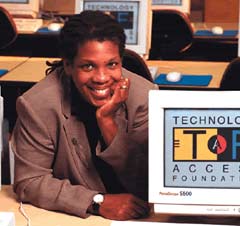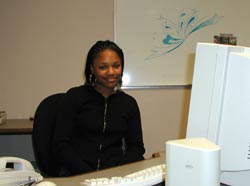
Trish Millines Dziko, former Microsoft employee and founder of the Technology Access Foundation in Seattle.
SEATTLE, Wash., August 25, 2003 — Seven years ago, Trish Millines Dziko realized her dream of providing students of color with advanced technology training. Dziko is the founder of the Technology Access Foundation (TAF), a non-profit organization in Seattle that provides much-needed computer education to underserved students of color and prepares them for success in a technology-driven world.
Three TAF programs focus on the educational needs of students from kindergarten through college by providing access to training and resources that goes well beyond what they receive in school:
-
TechStart uses technology-based activities to improve math, reading and critical-thinking skills for students aged 5-12. To date, more than 250 children have completed the TechStart program.
-
The Technical Teens Internship Program (TTIP) is a multi-year, intensive technology training program for high school and college students, which includes paid summer internships at participating companies. For each year that students successfully complete the training and internship, they receive a US$1,000 college scholarship. Since its inception in 1997, TTIP has served more than 250 students.
-
The Higher Education Bound program helps high school students enrolled in TTIP with searches for college scholarships, college entry exam preparation, curriculum selection and the application process.
To learn more about the foundation’s innovative work, PressPass spoke with TAF founder Trish Millines Dziko , a former Microsoft employee; Sherrell Dorsey , a 16-year-old junior at Franklin High School in Seattle who is completing her second summer internship at Microsoft; and Diane Smyth , test manager for the Productivity Tools group at Microsoft, who mentored Dorsey during her most recent internship.
PressPass: Trish, you have an interesting history. How did your own experience contribute to your decision to start the Technology Access Foundation?
Trish Millines Dziko: I became a firm believer in the power of higher education when I was 13 years old. I had decided that I wasn’t going to college, and rather than argue with me, my mother took me to work with her that summer. She was a domestic; the work was hard and the pay was low. By the end of the summer, I changed my mind about going to college.
When I graduated from Monmouth College in 1979, the pool of qualified minority candidates was small. I was one of very few African-Americans in technology — especially in programming — and one of few women. I met people who thought I shouldn’t be in that field, but I was raised to believe that I could do anything I wanted to do and that I shouldn’t let anyone stand in my way.
I joined the staff at Microsoft, and over the years I saw things improve a bit, but people of color continued to be underemployed in the technology industry. Microsoft wanted to diversify its workforce, and I became a liaison to help that happen. The other thing that changed was the value of technical skills — they became an important tool in business and academics. That’s one reason I started TAF; I wanted to help young people of color acquire skills that would give them access to many different career opportunities. Another reason is my interest in volunteering; my family taught me that you always give back.
PressPass: What is the purpose of TAF? How does it work?
Dziko: The foundation began in 1996, and our initial focus was providing Seattle communities of color with access to technology. It soon became clear that the bigger issue was a lack of minorities in the technology industry and a shortage of people to create content and teach others how to use technology.
We decided to shift our focus to teaching kids and giving them the real-world experience they need to make it in the technology field. This was a big task, and we knew we needed powerful partners to help us. That’s when we formed the TAF Alliance, a partnership of 29 corporations that provide funding as well as input on the subjects we teach. Our partners help us identify new trends in technology so we can provide a curriculum that’s current, and they also offer internships to our students so they can apply what they’re learning in the classroom to real-world problems.
These companies recognized our vision early, and Microsoft was there from day one as a founding sponsor. Microsoft CEO Steve Ballmer served as our chairman the first year, and he sent 200 letters to local companies inviting them to join in diversifying the workforce of the Puget Sound area. Microsoft also helped us with marketing and public relations.

Sherrell Dorsey, a 16-year-old junior at Franklin High School in Seattle, has spent the last two summers at Microsoft interning through the TAF program.
PressPass: It sounds as though the combination of curriculum and internships in the Technical Teens Internship Program adds up to excellent training. Sherrell, as an intern, how has the program worked for you?
Sherrell Dorsey: We did job preparedness for a month before I got here, so I was really well prepared. We learned a lot about the interview process, the culture at Microsoft, and what was expected of Microsoft employees. I felt confident walking in.
Diane Smyth: When Sherrell got here, she already had 180 hours of technical training. She is working on creating our lab manager’s Web site for the team, and her level of experience added immediate value to my team’s business needs. That translates into a much higher return on our investment in the internship program.
I’ve found that TTIP interns can spend more productive time on a project because they need less time for ramping up. Sherrell was able to hit the ground running and complete the entire project with minimal help.
Dziko: I don’t think we fully understand — as a country — that technology is just as important for our students to master as reading, writing and math. Many high schools don’t have the resources to fully address this need, and the result is that many kids don’t have the necessary technical experience. These kids spend their first year at college trying to catch up to students from more affluent high schools instead of focusing on the curriculum content. That is frustrating, and there are a lot of dropouts.
Another critical issue is the scarcity of people of color in technology jobs. Companies are striving to diversify the workforce, and TTIP provides excellent training. A student who has the opportunity to get three internships during high school and four during college is well prepared to compete for the best jobs.
PressPass: In addition to technical training, what are some other benefits of TTIP?
Dorsey: After my first week and a half in TTIP, I created my first Web page and discovered that I loved Web developing. My family thought I was a genius.
At Microsoft, I’m learning what it’s like to work eight hours a day, how to manage my time, and how to find the information and research I need to complete a project. It’s a lot like school, but more demanding.
I wasn’t thinking about a technical career when I started the program, but now I’m going to major in computer science when I go to college.
Smyth: When I look at Sherrell’s resume, I see that she is involved in a diverse range of activities — outside of school and family — which are a direct result of her participation in TTIP.
Dorsey : One of the requirements of the program is that we do 20 hours of community service. I tutored at an elementary school and designed a Web site for a non-profit.
Smyth : These experiences give her insight into the business world and interpersonal relationships. That, in turn, gives her a more mature and informed frame of mind to do this work. TTIP is a wonderful program.
Dziko: Kids know the program will be hard, but they learn so much and they are pleased to have the tools to learn. We teach them how to learn.
PressPass: Sherrell, how would you advise other students who are considering TTIP?
Dorsey: I’d advise them to join because it’s very diverse. You get more than technical skills; you get life skills. The time spent in the program is long, and sometimes it does get hard. Sometimes you might feel like dropping out when you see your friends having fun, but as soon as you get your first internship — and you graduate from the program with your scholarship money and your recommendations — it’s all worth it.
PressPass: How does TTIP benefit Microsoft and other participating companies?
Dziko: TTIP is a groundbreaking program that you won’t see anywhere else in this country. We have an excellent track record, and companies are realizing that participating in the program makes good business sense. It’s an excellent way for them to train and recruit qualified technology employees and diversify their workforce, so they’re willing to make it an integral part of how they do business.
Smyth: I agree. Every year I grab as many TTIP interns as I’m allowed to take. In the testing world we never have enough resources to do the work we’re asked to do, so it’s exciting and rewarding to find those students who are bright, energetic, and highly skilled. They are the shining stars of the future.
PressPass: Trish, what are your goals for TTIP and TAF? And what’s your biggest challenge?
Dziko: My goal is to build a high-end technology and family academic center in Seattle’s Rainier Valley. We’ve been talking about this for years, and now our track record gives us the kind of credibility that will encourage individuals and corporations to invest in us.
We plan to use the center as a magnet to draw people in and tell them about the importance of technology and the value of technology education. We will provide the opportunity for people to get those skills.
Our biggest challenge is funding. People would be surprised to know how much it costs to run a program like this, to pay for staff, equipment and space. It takes an average of $2,500 to put each student through TTIP, but the rewards are beyond measure. Teaching technology to our children is critical to the future of our economy.
At TAF, our motto is a question:
“What if opportunity were color blind?”
Because we believe technology allows everyone to compete equally and realize their own potential, we’re using technology to build futures — one kid at a time.




